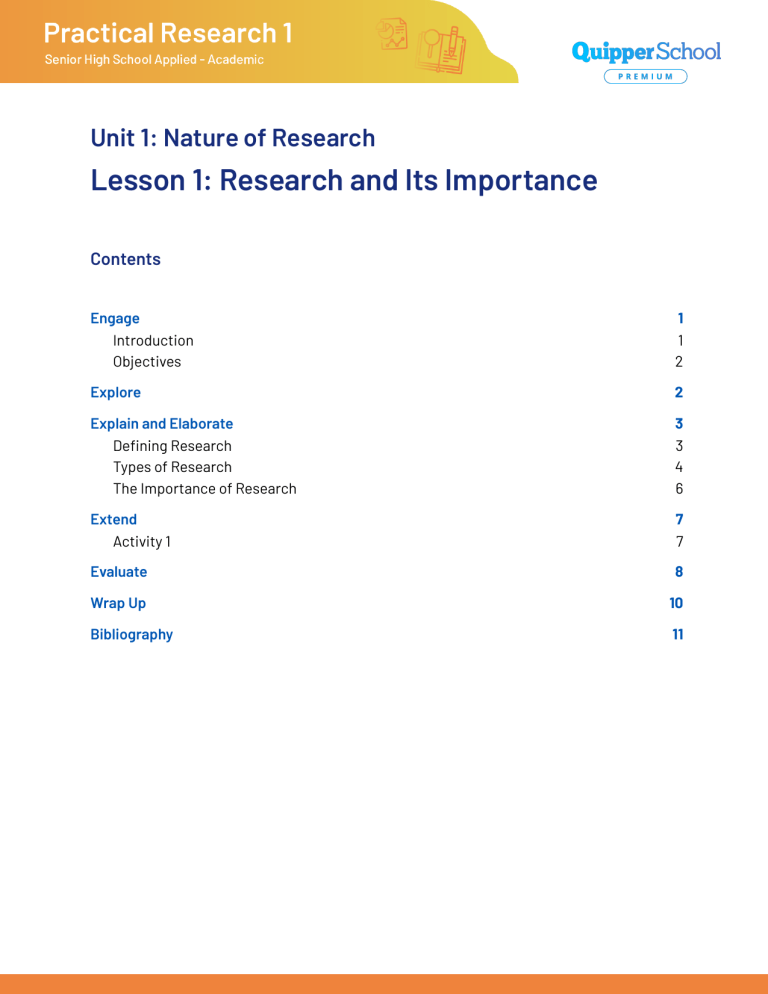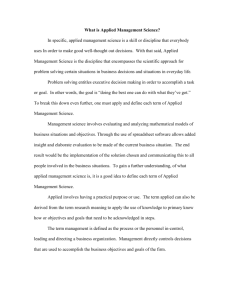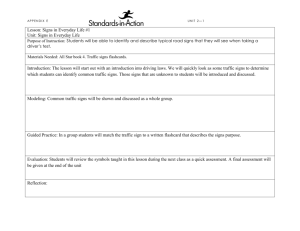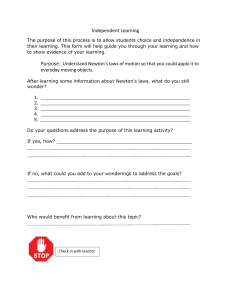
Unit 1: Nature of Research Lesson 1: Research and Its Importance Contents Engage Introduction Objectives 1 1 2 Explore 2 Explain and Elaborate Defining Research Types of Research The Importance of Research 3 3 4 6 Extend Activity 1 7 7 Evaluate 8 Wrap Up 10 Bibliography 11 Unit 1.1: Research and Its Importance Engage Introduction Fig. 1. Question mark pile At present, we are surrounded by products of technology that make our lives easier, whether in school, at home, at work, or even in a foreign country. There is a product available for almost any human need, and the development of these products is still ongoing. Have you ever wondered how these products came about? How were they produced? How did their creators know the purposes they would serve? Human innovation is made possible by doing research. Research allows people to expand their knowledge on simple curiosities and to apply the newfound knowledge creating products that can make lives easier and more comfortable. This lesson gives the definition, types, and importance of research. 1 Unit 1.1: Research and Its Importance Objectives In this lesson, you should be able to ● Define research and the different types of research. ● Explain the academic and practical importance of doing research. DepEd Competencies ● Share research experiences and knowledge. (CS_RS11-IIIa-1) ● Explain the importance of research in daily life. (CS_RS11-IIIa-2) Explore 5 minutes Find a partner for this pair activity. As a pair, ask each other the following question: “What do you know about the importance of doing research?” Write your answers on the space below. Name Answer 1. 2. 2 Unit 1.1: Research and Its Importance Discuss your answers with your partner using the guide questions found below. Guide Questions 1. What are the key points of each of your answers on the importance of doing research? 2. What are the similarities and/or differences of your answer and your partner’s answer? 3. How does research affect your daily life? Explain and Elaborate Defining Research O’Leary (2004) cites the Oxford English Dictionary in defining research as “the systematic study of materials and sources in order to establish facts and reach new conclusions.” Being a systematic process with the goal of establishing facts, doing research goes beyond a simple question-and-answer type of inquiry. It requires following a logically-ordered 3 Unit 1.1: Research and Its Importance procedure that often starts with a question and ends with an answer that is supported by facts. Research begins with a question. This question may have been formulated based on everyday life experiences, individual curiosities, or random observations. Once an individual engages in the process of gathering information to answer a question, he/she is already conducting simple research. For example, you like chocolate-flavored drinks. You noticed that when you take a chocolate-flavored drink at night, it takes you a longer time to fall asleep than you usually do. This observation then leads you to ask, “Why do I have a hard time falling asleep when I take a chocolate-flavored drink at night?” You then proceed to find out whether your favorite chocolate-flavored drink has a role in your sleeping patterns. You look at the list of ingredients and use the Internet or other reference materials to establish a connection between these ingredients and sleeping patterns. Your inquiry gives you the answer that a particular ingredient found in chocolate can boost energy levels. With this simple process, you have made sense of your observation of why your favorite chocolate-flavored drink keeps you awake at night. This process of starting with an observation, developing this observation into a question, and undertaking a certain process to answer this question is the process of doing research. What is the role of research in a person’s everyday life? Types of Research The example above of establishing the connection between chocolate-flavored drinks and sleeping patterns is a simple research problem that is based on everyday life experiences and observations. At a broader level, research can be classified into two major types: basic research and applied research. 4 Unit 1.1: Research and Its Importance Basic Research According to Vanderstoep and Johnston (2009), basic research is “an investigation that adds to the knowledge of a particular area of study.” O’Leary (2004) also refers to basic research as “pure research.” Basic research is primarily undertaken to gain a broader understanding of a particular problem or phenomenon. The result of a basic research may not necessarily be directly applicable to real-world settings, but it can be a source of new ideas, concepts, or theories. Examples of basic research include answers to curiosities, such as the role of the government in providing basic social services, the therapeutic effects of pet ownership, and studying parenting styles across different Asian cultures. At this level, these examples are mostly theoretical and are not directly applicable as solutions to real-life problems and concerns. Review Research is a systematic process of gathering information to answer a particular problem. Applied Research In contrast to basic research, applied research is “an investigation that does have obvious and immediate applications” (Vanderstoep and Johnston, 2009). According to O’Leary (2004), “knowledge gained from applied research is meant to find solutions to actual problems.” Examples of applied research include medical research (e.g., the effectiveness of vaccines in preventing infectious diseases), political science research (e.g., the effectiveness of mass media in electoral campaign), and market research (e.g. the effectiveness of social media advertisements in increasing sales). These examples of applied research have their corresponding fields of application, thus making them directly useful in real life. 5 Unit 1.1: Research and Its Importance Basic research and applied research are related to each other. Still, basic research can be conducted independently from applied research since it is more theoretical than practical. The knowledge generated from basic research can be used as the foundational ideas for applied research. For example, mathematical research such as the development of number formulas and sequences constitutes basic research. This mathematical knowledge can be used in the development of new technology, such as computer codes, which then constitutes applied research. Another example is the development of medicines. The development of a particular medicine for a specific disease demonstrates the use of applied research. However, knowledge about the chemical components of the said medicine, reactions of these chemical components with one another, and the nature of the disease being treated are products of basic research. Remember The main goal of basic research is to acquire knowledge to understand the world better. On the other hand, the main goal of applied research is to use the acquired knowledge in the daily lives of people. The Importance of Research In general, doing research is important because: ● It helps us understand the world better. Research often begins with a simple question that is drawn from everyday experiences or observations. Gathering information to answer any question that sparks interest contributes to a broader understanding of the world. ● It allows us to find answers to problems. The systematic procedure of doing research provides a logical structure of finding answers to problems. These answers 6 Unit 1.1: Research and Its Importance may come in the form of new ideas, as in the case of basic research, or practical solutions, as in the case of applied research. ● It enables us to evaluate our answers to different problems. The solutions generated from research can be the source of more questions. Doing further research on an existing answer can lead to a broader understanding of how this answer is a corresponding solution to a particular problem. Specifically, both basic research and applied research are essential. Basic research is most useful in an academic setting because it generates new ideas or leads to the expansion of these ideas. On the other hand, applied research is used most appropriately in practical and real-life settings. The theoretical knowledge established through basic research can serve as a reference for applied research. Extend Activity 1 Think of two researchable questions based on everyday life experiences, encounters, or observations. If you were to seek answers to these questions, classify which type of research is applicable to each of them. Questions Classification (Basic/Applied) 1. 2. 7 Unit 1.1: Research and Its Importance Guide Basic research serves the purpose of satisfying human curiosities. If the answer to your common question does not have direct application to real-life instances, then you are thinking about a question that is best answered by doing basic research. Applied research is done for specific purposes and applications. If the answer to your common question has an immediate application in real life, then you are thinking of a question that is best answered by conducting applied research. Evaluate A. Identify the concept described below. Write your answer in the space provided. 1. This is the type of research that is most useful for practical purposes. 2. It is the systematic process of gathering information to find answers to questions. 3. This is the type of research that generates new knowledge, ideas, concepts, or theories. 8 Unit 1.1: Research and Its Importance B. Classify each example of a research topic as basic research or applied research. Write your answer in the space provided. 1. The relationship between social media use and the sleeping habits of teenagers 2. Improving user engagements in online business advertisements 3. Assessment of alternative routes to decongest roads and to improve traffic flow in Metro Manila 4. Potential effects of volcanic eruptions on the atmosphere 5. A survey on new food combinations for a restaurant menu 9 Unit 1.1: Research and Its Importance Wrap Up ___________________________________________________________________________________________ Research is a systematic process of gathering information to answer a question or solve a problem. 10 Unit 1.1: Research and Its Importance ___________________________________________________________________________________________ Bibliography Booth, Wayne C., Gregory G. Colomb, and Joseph M. Williams. The Craft of Research, 3rd ed. Chicago: The University of Chicago Press, 2008. Neuman, W. Lawrence. Social Research Methods: Qualitative and Quantitative Approaches, 7th ed. Essex: Pearson Education Limited, 2014. O’Leary, Zina. The Essential Guide to Doing Research. London: SAGE Publications Ltd., 2004. Schutt, Russell K. Investigating the Social World: The Process and Practice of Research, 9th ed. California: SAGE Publications Inc., 2019. Vanderstoep, Scott W., and Deirdre D. Johnston. Research Methods for Everyday Life: Blending Qualitative and Quantitative Approaches. San Francisco: Jossey-Bass., 2009. 11



